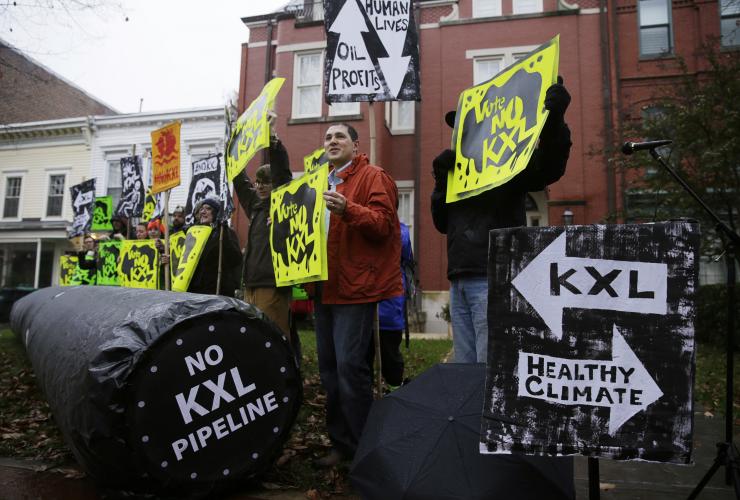South Dakota has become a hostile environment for those who enjoy exercising their right to free speech. Over the past few months, the right to assemble and speak freely has also come under attack in the state as lawmakers rushed to pass Senate Bills 189 and 190. The bills were created to discourage violent protests of the Keystone XL Pipeline; however, the short amount of time the lawmakers spent debating the bills left the final language vague and overly broad.
While proponents argue the new regulations are necessary to prevent violence, the unclear language of the law puts protesters’ freedoms in jeopardy and favors TransCanada’s pipeline over the constitutional rights of those who wish to protest the pipeline’s construction. Senate Bills 189 and 190 combine to make the act of “riot boosting” a crime, subject to monetary fines, civil action, and criminal penalties. The law is written so broadly that even non-participants in a protest who “direct(), advise(), encourage(), or solicit() other persons participating in the riot to acts of force or violence” can be prosecuted as a “riot booster.” According to the American Civil Liberties Union, “even a tweet encouraging activists to ‘Join a protest to stop the pipeline and give it all you’ve got!’ could be interpreted as ‘riot-boosting’ should a fight break out at the protest.”
This new regulation will deter Americans from joining in protests and exercising their First Amendment rights for fear of legal repercussions that could be brought under the new law. Laws that cause citizens to fear speaking freely, like S.B. 189 and 190 will, are a textbook example of the type of government intervention that the First Amendment is designed to prevent.
Of course, the First Amendment’s protection of speech is not absolute, and incitement is one of its classic exceptions. To protect the public, speech that is intended to produce imminent lawless action does not fall under the scope of the First Amendment. This means that any protesters who use expression aimed at creating imminent lawless action – such as a riot – will not be protected by the Bill of Rights and may be subject to legal penalties.
South Dakota lawmakers may have intended only to “ensure the Keystone XL pipeline and other future pipeline projects are built in a safe and efficient manner,” as Governor Kristi Noem said upon introducing the legislative package. However, the term “riot boosting” in S.B. 189 and 190 makes no distinction between actual rioters and those simply exercising their right to speak. As a result, the “riot boosting” law will likely lead citizens to shy away from criticizing the installment of the pipeline.
Unfortunately, South Dakota is not the only place where the government has sought to chill protest activity. At the federal level, the National Park Service (NPS) took steps in August 2018 to crack down on protests in Washington, D.C. In particular, NPS proposed rules to abolish its practice of not charging protesters for cost recovery after using the National Mall as a forum to petition elected officials. IFS commented in November that this proposal would chill speech.
Our comments noted that the Congressional funding NPS receives should be used to pay for any necessary monitoring and clean-up related to First Amendment activity. The cost recovery fee, like the provision in South Dakota’s “riot boosting” law, appears designed to limit protests.
The right to publicly speak about the government is a fundamental part of the American tradition. All are welcome to engage in free speech through public protests, not just those who can afford to pay a protest fee. Whether in the nation’s capital or in states like South Dakota, the right to assemble and speak freely must be protected against misguided proposals like these.














